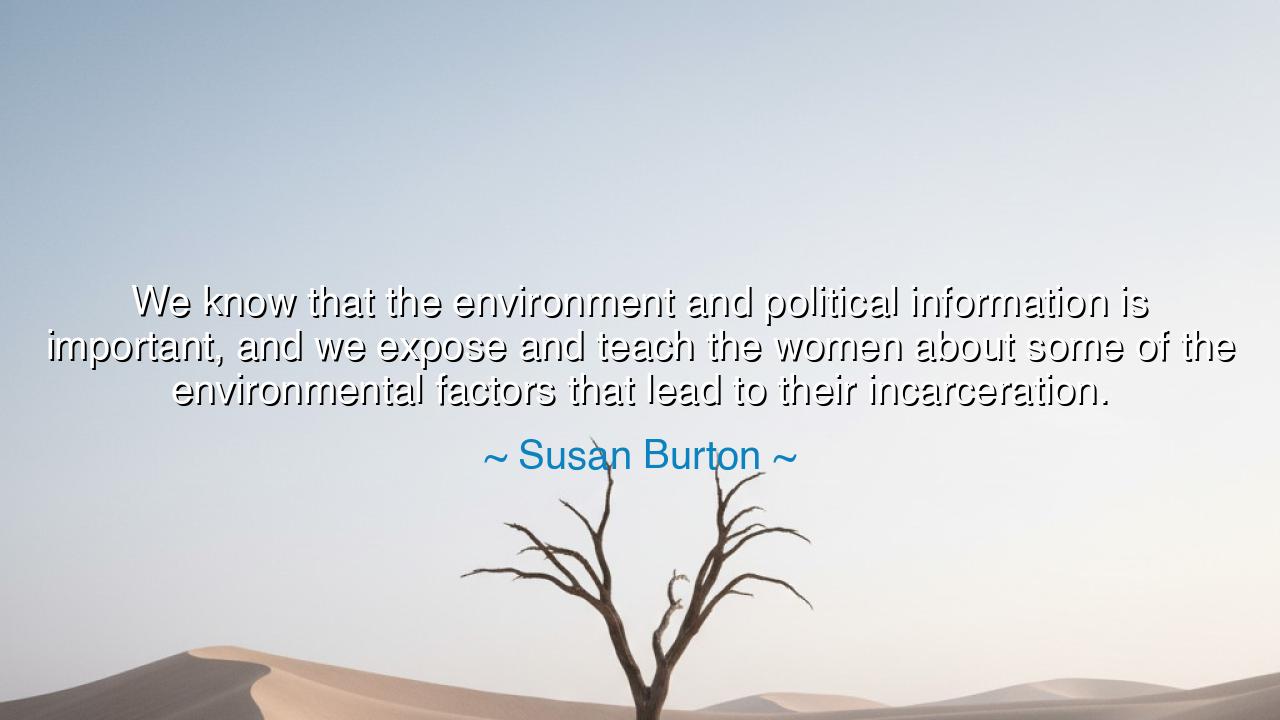
We know that the environment and political information is
We know that the environment and political information is important, and we expose and teach the women about some of the environmental factors that lead to their incarceration.






Hear the voice of Susan Burton, who rose from chains to become a liberator of others, and who declared: “We know that the environment and political information is important, and we expose and teach the women about some of the environmental factors that lead to their incarceration.” These words are not spoken lightly; they are forged in the fires of lived struggle, a testimony from one who walked the path of despair and turned it into a road of deliverance for others. Burton, once imprisoned herself, saw that prison was not born from crime alone, but from the soil in which people’s lives were planted.
The origin of this saying is rooted in Burton’s work with A New Way of Life Reentry Project, an organization she founded to help women leaving prison rebuild their lives. Through her own suffering, she recognized that incarceration is not merely the product of individual failing, but the harvest of poverty, racism, addiction, trauma, and the indifference of society. To teach women about the environmental factors of their suffering is to open their eyes to the truth: that they were caught not only by bars of iron, but by the unseen bars of circumstance and neglect.
Think of the story of the American ghettos in the late twentieth century. Communities were stripped of jobs, flooded with drugs, and heavily policed. Children grew up in houses where despair was inherited like a family heirloom. Women, often bearing the double burden of poverty and caretaking, turned to survival strategies that led them into the hands of the law. Without knowledge, they might believe their fate was purely personal, that they alone were to blame. But with teaching, with exposure to the forces of policy and history, they see that their suffering was not an isolated fault but part of a greater system. Burton gives them this knowledge, so they may transform shame into resistance.
History speaks this truth also. In the France of the 19th century, Victor Hugo wrote of Jean Valjean, imprisoned for stealing bread to feed his family. The law saw only a thief; the wise saw the hunger that pushed him to the act. In every age, the poor have been punished not only for what they did, but for where they were born, what they lacked, and how society cast them aside. Susan Burton’s teaching is part of this ancient wisdom: to look beneath the crime and see the root, to understand that justice cannot exist until the roots are healed.
Her words also reveal the power of political information. For it is not enough to recognize that the soil is poisoned; one must also know who poisons it, and why. To educate the women is to awaken them to the reality that laws, policies, and leaders shape their environment. With knowledge, they can rise not only as survivors but as advocates, as voices demanding change, as builders of a new order where cycles of incarceration no longer devour generations. Knowledge turns despair into strength, and strength into action.
The lesson for us is this: never judge a person’s fall until you have seen the ground beneath their feet. Many are trapped not by their own will but by the weight of environmental factors—poverty, violence, racism, addiction, lack of education. When we understand this, compassion replaces condemnation, and justice demands transformation rather than punishment. To heal society, we must heal the soil from which its people grow.
And what then shall we do in our own lives? We must listen to the voices of the marginalized, as Burton listened and lifted. We must teach, support, and build communities where women and men are not driven toward prison but toward possibility. We must challenge unjust policies, demand rehabilitation instead of destruction, and extend compassion rather than scorn. On a personal scale, we can mentor, donate, volunteer, or simply refuse to repeat the lie that those who are incarcerated are beyond redemption.
So remember the wisdom of Susan Burton: prisons are not built only of stone and steel—they are built of environments that starve, oppress, and wound. To free the people, we must free the soil. Teach, heal, nurture, and stand beside the fallen, that they may rise and carry others with them. Only then shall we break the cycle of despair and create a world where justice truly lives.






AAdministratorAdministrator
Welcome, honored guests. Please leave a comment, we will respond soon